Dementia: Carer encourages other men to seek support
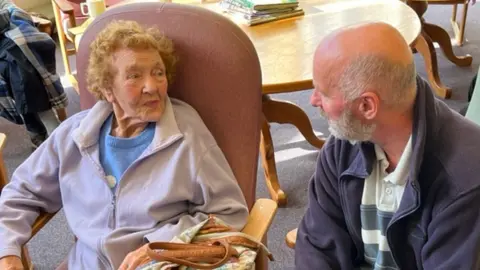 BBC
BBCEvery three minutes, someone in the UK develops dementia. One day centre for people with the condition has seen referrals double and staff are encouraging more male carers to seek support. BBC News' Kevin Shoesmith listened to one couple's story.
Norma Reffin waits, smiling, in the communal lounge.
Her partner of 40 years, Stefan Williamson, is in a nearby office.
Gesturing towards the lounge, he explains to me: "When we go back in there, it will be like I've been away two years."
Stefan, 62, says he often holds 83-year-old Norma's hand, hoping touch might be understood where the meaning of words could be lost.
"It hurts," he admits. "But we are together, that's the main thing. She will say to me things like, 'you won't leave me will you?'"
Norma is one of about 60 people with dementia who attend Hull's Endike Community Care centre regularly. Stefan is just one of an increasing number of men caring for loved ones like her who are living with the condition.
It is a stark fact, but every three minutes, someone in the UK develops the condition, says the charity Dementia UK.
'I was stubborn'
Staff at Endike say they have seen referrals to the centre double in the past two years.
However, they say men looking after loved ones with dementia often find it difficult to open up about their worries and the stresses they face as full-time carers.
They say they want to see that change and are encouraging more men to seek support.
Stefan admits he has certainly found being Norma's carer to be one of the biggest challenges he has faced in his life.
He describes the centre as a "godsend" after Norma developed the condition some years ago.
"I thought I could do it. I thought I could take care of her on my own. I was stubborn," he says.
"The only time I can relax or get things done is when Norma is here.
"I know she's safe here."
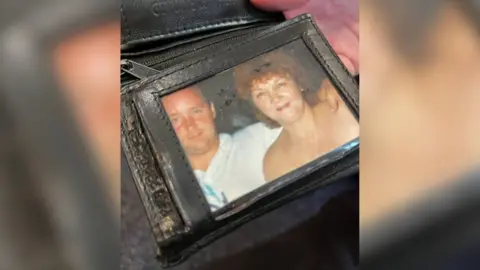
Stefan pats his pocket, searching for his wallet. Tucked inside is a photograph.
"It was taken not long after we'd met," he says. "I was walking past the Elephant and Castle pub in Holderness Road one day and I noticed this lady, and I thought 'she looks nice.'
Stefan says he fell for her "kind face" and "jovial" outlook.
In late 2017, Norma, who has two children from a previous relationship, was diagnosed with Alzheimer's disease.
"Just like that - the woman I love changed," says Stefan, snapping his fingers.
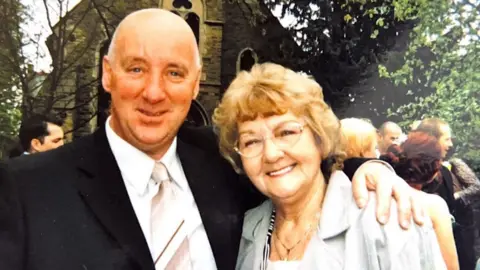
Norma began accusing Stefan of moving things around their home.
With support from other family members, Norma visited her GP who referred her to specialists.
Stefan has brought with him a pile of photographs showing Norma over the years.
He could not decide which to bring, so brought them all - including one of Norma, as a little girl, holding her sister's hand.
There are also photographs of the pair on holiday in Great Yarmouth - their special place.
Our conversation darts from the past to the present. But never the future.
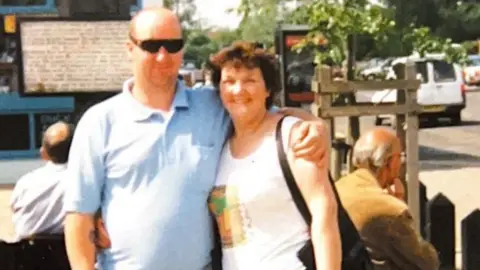 Stefan Williamson
Stefan WilliamsonIn the lounge, manager Eileen Wright tells me the centre gives carers the chance "to recharge their batteries".
"When you are caring for someone 24/7, it can be very difficult," she says. "Some of the stories we hear are heart-breaking".
Eileen says men "have a lot of pride" and are often reluctant to ask for help.
"Women carers tend to talk to their friends and others in the same position. But a lot of men, we find, won't let the world in.
"If a male carer passes away, the remainder of the family will often say they had no idea how much he did for their loved one."
Eileen says her staff encourage male carers to talk.
"They don't have to just drop off and collect their wives or partners," she says. "We invite them in for a cup of tea and a chat."
'Deep sense of duty'
According to Dementia UK, the condition is "a huge and growing health crisis" with more than 900,000 people in the UK currently diagnosed. That figure is expected to rise to 1.1m by 2030, the charity says.
Paul Edwards, director of clinical services at Dementia UK, urged men to seek help.
He said: "Supporting a person with dementia is tough and there is no shame in asking for help."
With cases of dementia rising, he said there is an ever-greater need "to open up conversations around barriers" that prevent some men seeking support.
"We know that carers often feel a deep sense of duty and pride to care and cope on their own," said Mr Edwards. "This can lead to a reluctance to seek support which may well impact negatively on their physical and mental wellbeing."
Dementia UK said its Admiral Nurses - named after the charity's founder Joseph Levy CBE BEM who was known as Admiral Joe due to his love of sailing - provide practical and emotional support to all family members.
Stefan tells me: "More men need to talk about what they're feeling. I'll admit, I didn't at first.
"Some men are perhaps too proud to talk, but it helps to talk over things with people who know."
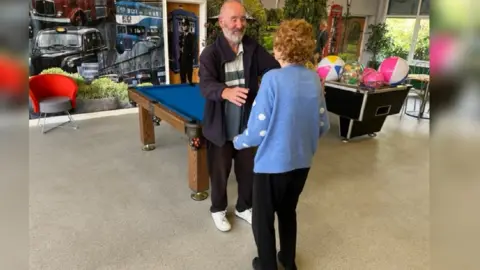
As we return to the lounge, he says: "When I look at her now, I sometimes wonder what's going on in her mind."
Norma's face lights up when she spots Stefan.
He asks if she would like some "lippy" on for a photograph. They then embrace.
"Right pair of love birds them two," chirps a staff member.
"Where have you been?" asks Norma. "I thought you'd left me."
If you are affected by issues raised in this article, help and support is available via the BBC Action Line

Follow BBC East Yorkshire and Lincolnshire on Facebook, Twitter, and Instagram. Send your story ideas to [email protected].
